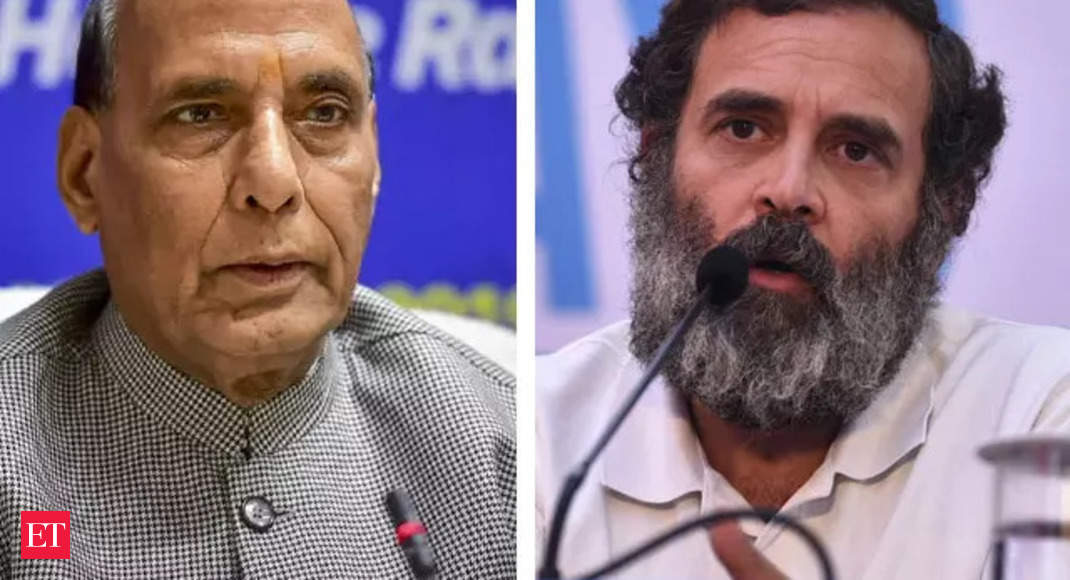


In his first speech as Leader of the Opposition in the Lok Sabha, Rahul Gandhi accused the Centre of treating soldiers as 'use and throw' labourers under the Agnipath scheme. Defence Minister Rajnath Singh countered his claims by highlighting the provisions for martyr status and compensation under the scheme. The Defence Minister also called out Gandhi for spreading false information and cautioned him against misleading the House. Gandhi's accusation against the BJP-led NDA government came under scrutiny as the facts emerged, showing that Agniveers receive adequate support and recognition from the government.
Rajnath Singh Counters Rahul Gandhi's Accusations on Agnipath Scheme
In a recent session of the Lok Sabha, former Congress President Rahul Gandhi raised concerns about the Agnipath scheme, alleging that the government was treating soldiers as "use and throw" laborers. Defense Minister Rajnath Singh strongly countered these claims, highlighting the provisions for martyr status and compensation under the scheme.
Background of the Agnipath Scheme
The Agnipath scheme was launched in June 2022 as a major reform in the recruitment process of the Indian Armed Forces. Under the scheme, young individuals between the ages of 17.5 and 21 are recruited into the military for a four-year period. After four years, 25% of the recruits may be selected for permanent enrollment into the Armed Forces, while the remaining 75% will be released from service.
Rahul Gandhi's Accusations
Gandhi criticized the Agnipath scheme, claiming that it would lead to job losses and undermine the morale of the armed forces. He also alleged that the scheme was designed to privatize the military and reduce the number of permanent personnel.
Defense Minister's Response
Defense Minister Rajnath Singh strongly defended the Agnipath scheme, stating that it was a necessary reform to meet the changing needs of modern warfare. He emphasized the provisions for martyr status and compensation under the scheme, ensuring that Agniveers (as the recruits are called) and their families would receive support in case of any unfortunate events.
Singh also criticized Gandhi for spreading false information and cautioned him against misleading the House. He cited the facts that Agniveers receive adequate training, salary, and benefits, including medical insurance and ex-servicemen benefits after their four-year period of service.
Scrutiny and Emergence of Facts
As the debate surrounding the Agnipath scheme continued, it became evident that Gandhi's accusations were unfounded. The facts emerged, showing that Agniveers receive substantial support and recognition from the government.
Top 5 FAQs and Answers
1. What is the Agnipath scheme?
The Agnipath scheme is a new recruitment process for the Indian Armed Forces where young individuals are recruited for a four-year period.
2. What are the benefits of the Agnipath scheme?
Benefits include training, salary, medical insurance, ex-servicemen benefits, and the opportunity for permanent enrollment into the Armed Forces.
3. How many Agniveers will be recruited each year?
Approximately 45,000 to 50,000 Agniveers will be recruited annually.
4. What is the future of Agniveers after their four-year period of service?
25% of Agniveers may be selected for permanent enrollment into the Armed Forces, while the remaining 75% will receive support for post-service employment and higher education.
5. Has the Agnipath scheme been criticized?
Yes, some have raised concerns about job losses and the impact on the morale of the armed forces, but the government has defended the scheme as necessary for modern warfare.

The Pasighat police in East Siang district, Arunachal Pradesh have arrested the 33-year-old boys' hostel warden of Sanggo English School for sexually assaulting minor students. This came to light when a student was hospitalized for urogenital complications. The incident has sparked outrage from parents and the public, demanding strict action against the accused warden. In response, the Arunachal Pradesh State Human Rights Commission (APSHRC) has taken suo motu cognisance and ordered for a detailed report on the investigation, victim protection, and school management.

Actress Siddiqa Begum, daughter and legal heir of Shah Bano, has served a legal notice on the makers of the upcoming Bollywood film 'Haq'. The notice states that the film's unauthorized depiction of the personal life of Shah Bano without the consent of her legal heirs is a violation of their rights. 'Haq' is based on the landmark 1985 Supreme Court case that granted maintenance to Shah Bano, a Muslim woman, from her divorced husband.

After four years, the 'Darbar Move' tradition in Jammu and Kashmir has been restored, fulfilling the promise of the government and bringing a boost to the economy. National Conference chief Farooq Abdullah expressed happiness, noting that those who sought to separate Jammu and Srinagar have failed. Chief Minister Omar Abdullah received a warm reception and inspected the secretariat premises after the ceremony, as security in the region was heightened for the occasion.

Delhi Legislative Assembly Speaker Vijender Gupta praised Swami Dayanand Saraswati as not just a saint and reformer, but also a pivotal figure in India's freedom struggle. Speaking at the International Arya Samaj Conference, Gupta highlighted how Swami Dayanand's teachings sparked a revolution that led to the nation's independence. The event was attended by esteemed guests including Gujarat Governor Acharya Devvrat and top officials from the Arya Samaj community, all paying tribute to the enduring impact and legacy of Swami Dayanand Saraswati.

The Metro Railway Kolkata has announced a major schedule expansion for its Yellow Line, which runs between Noapara and Jai Hind Bimanbandar (Airport) in Kolkata. Starting from 3 November, weekday operations will increase to 120 services with extended operating hours, providing greater convenience and accessibility to commuters. Weekend travellers will also see a significant frequency upgrade, making travel on Saturdays and Sundays hassle-free. This move is expected to improve the overall public transportation system in the city and benefit the commuters.

Despite some reassurances that online verticals focused on diversity will continue, NBC News has announced a round of layoffs that will impact about 150 employees, or 2% of their workforce. The cuts are said to be a result of cost-cutting measures in preparation for the split of Comcast's cable networks into Versant. This move signifies a shift in priorities for NBC management, prioritizing corporate profits over hard-working members, according to Susan DeCarava, president of The NewsGuild of New York. This change also means that MSNBC will no longer lean on NBC News for newsgathering, with those ties expected to be severed next week.

The Kasibugga Venkateswara Temple in Srikakulam district was the site of a heart-wrenching stampede, causing multiple fatalities and affecting the community deeply. Chief Minister N. Chandrababu Naidu has expressed his sorrow over the unfortunate incident, as well as directing officials to ensure that those injured receive the best medical treatment possible. As local officials and public representatives are called to oversee relief operations, swift action is required to aid those affected and manage the situation effectively.

Indian Prime Minister Narendra Modi inaugurated the Shanti Shikhar Academy for Peaceful World in Raipur, praising the Brahma Kumaris organization for bridging India's ancient wisdom with the world's search for harmony. He credited the group's selfless service and spiritual discipline for their efforts towards universal peace. He positioned the Brahma Kumaris as protectors of India's soul and highlighted India's proactive role in addressing global crises such as disaster relief and environmental threats.

In an act of solidarity and protest, millions of Muslims in India used their Friday prayers to denounce the recent killings that took place in Pahalgam. The news comes amid growing tensions between the Muslim community and the Indian government. Many are viewing this as a sign of unity and determination from the Muslim population in India.

The state of Karnataka, or Kannada Rajyotsava, marked its 69th anniversary with a grand ceremony organized by the district administration in Mangaluru. District in-charge minister Dinesh Gundu Rao paid tribute to the leaders and writers who fought for a unified Kannada state and presented awards to 80 outstanding individuals and organizations. In his address, the minister highlighted the rich cultural and historical heritage of Karnataka and called for a sense of pride among its citizens.